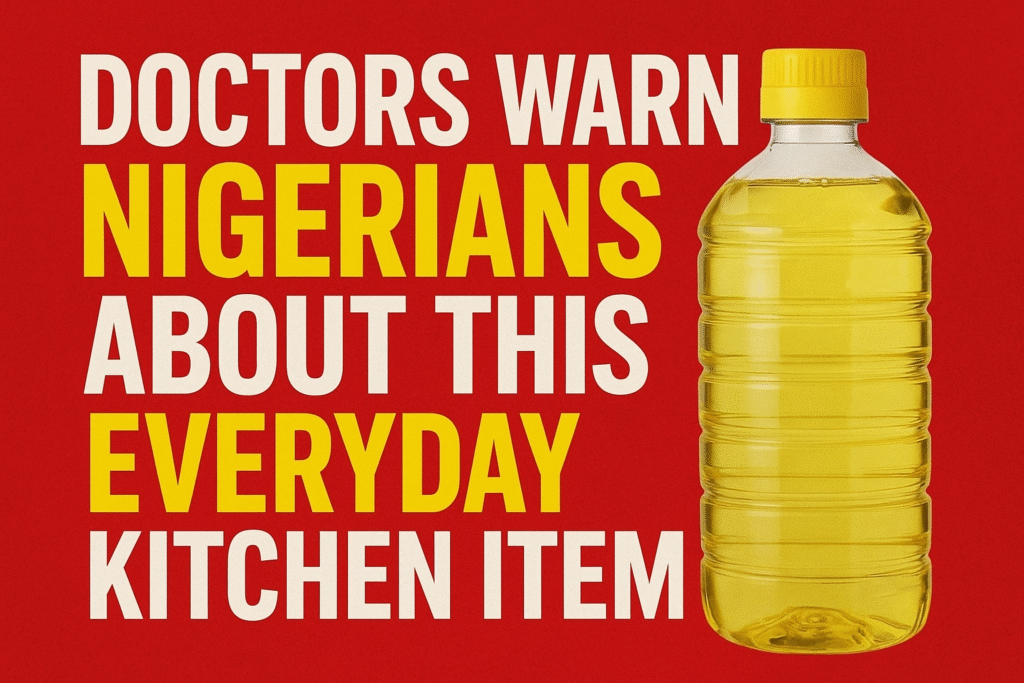When you step into a Nigerian kitchen, you’re likely to see vibrant spices, freshly pounded yam, sizzling oil in the pan, and the aroma of jollof rice or egusi soup in the air. But beneath this familiar scene, health experts are warning about a hidden danger lurking in almost every household — an everyday kitchen item that could be damaging your health without you knowing.
This item is refined cooking oil — particularly those cheap, unbranded varieties flooding Nigerian markets. According to multiple Nigerian doctors and nutrition experts, many popular cooking oils sold in open markets and even supermarkets are heavily processed, high in unhealthy trans fats, and sometimes contaminated due to poor storage conditions.
Why Doctors Are Concerned
Trans fats, often found in low-quality cooking oils, have been linked to heart disease, obesity, diabetes, and even certain cancers. In Nigeria, where fried foods like akara, plantain, puff-puff, chin chin, fried yam, and meat are staples, the overuse of these oils poses a serious public health risk.
Dr. Olufemi Akinlade, a Lagos-based cardiologist, warns:
“The problem is not just the oil itself, but how Nigerians use and reuse it. When oil is repeatedly heated, it undergoes chemical changes that make it toxic. This is a slow poison.”
The Common Mistakes Nigerians Make in the Kitchen
-
Reusing Oil Multiple Times
Many households reuse frying oil to “save money,” not realizing that each reheating increases harmful compounds. -
Buying in Bulk Without Checking Quality
Open market oils often sit in uncovered drums, exposed to dust, flies, and sunlight, leading to oxidation and contamination. -
Ignoring Labels and Expiry Dates
Some Nigerians choose oil purely based on price, without checking if it meets Nigerian Industrial Standards (NIS).
Hidden Health Effects You May Not Notice Immediately
You might not feel sick after eating food fried in bad oil, but over time, these hidden health problems may develop:
-
Blocked arteries (leading to heart attacks or stroke)
-
Weight gain and obesity
-
High cholesterol levels
-
Increased risk of type 2 diabetes
-
Liver damage
Doctors’ Recommendations for Safer Cooking
-
Choose High-Quality Oils
Go for olive oil, sunflower oil, or unrefined red palm oil in moderation. If you must use vegetable oil, pick a trusted, sealed, branded product. -
Avoid Reusing Oil More Than Once
Reheating oil breaks it down into harmful chemicals. -
Store Oils Properly
Keep them away from direct sunlight in airtight containers. -
Moderate Your Fried Food Intake
Balance fried meals with fresh fruits, vegetables, and boiled or grilled alternatives.
Why This Warning Matters to Nigerians Right Now
Nigeria is experiencing a growing health crisis. According to the World Health Organization, cardiovascular diseases are among the top causes of death in the country, and unhealthy diet habits play a major role. Given how much Nigerians love their fried foods, the message from doctors is urgent — the oil you use daily could either protect your heart or slowly harm it.
The Takeaway
If you’ve been ignoring the quality of your cooking oil, it’s time to take a second look. That “cheap and cheerful” oil in your kitchen could be a silent threat to you and your family’s health. By making informed choices today, you can enjoy your favorite Nigerian dishes without putting your future at risk.




